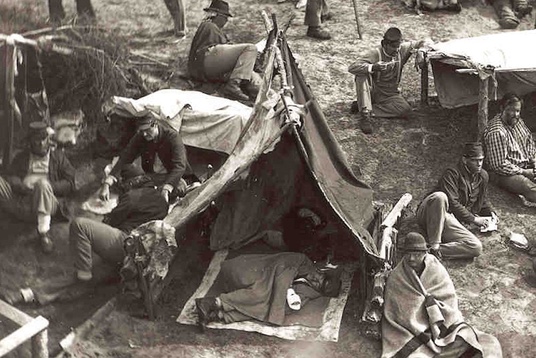Thu 8/11 @ 7PM
The Andersonville Trial, a play by Saul Levitt, will be performed by the Courthouse Players on Thu 8/11 at the Grove Amphitheater in Mayfield Village. The performance is free and open to the public. Bring your lawn chairs, blankets and picnic baskets to enjoy this dramatic presentation in a beautiful open air setting. Join members of the Civil War Roundtable at 5:45pm at the Pavilion for a pre-performance discussion.
The play tells the story of Confederate Capt. Henry Wirz, the only person tried for war crimes after the Civil War. Wirz was the commander of the notorious Andersonville Prison, where 14,000 Union soldiers died of starvation, disease and exposure — a prisoner of war camp that had the most deaths of Union soldiers in the shortest period of time. Drawing largely on the transcript of the original 1865 trial, playwright Levitt tells this powerful and grim story of unchecked dysentery, shoddy sanitation and lack of proper food that lead to the horrendous loss of life.
Andersonville Prison, opened in 1864 near Americus, Georgia, lacked even basic housing for the prisoners. Prisoners had to do the best they could for shelter against the blistering Georgia sun in the summer and cold in the winter. Food was at a minimum and the only source of water was a stream that was located downstream from a Confederate camp that polluted the water with human and animal waste.
To add to the horrors of the conditions, marauding gangs of prisoners preyed on incoming prisoners and stole or killed for what meager provisions were available, criminals whose conduct went unchecked by the Confederate guards — all under the command of Captain Wirz.
While Wirz and his defense team contend that the captain was only following orders and unable to prevent the tragedy, prosecutors countered with the argument that the chain of military command did not supersede the moral and ethical obligations Wirz owed to the men under his watch — that basic duty that a commander has to the captured prisoners.
The gross contemptibility of Wirz’s conduct made him, then and now, anything but a sympathetic figure, even in the sickened condition he was in during the trial. When local Confederate women brought fresh vegetables to the starving men, Wirz refused to accept the food and turned the women away. He drew arbitrary lines within the prison called “dead zones” which — if passed — resulted in summary execution. He refused to do anything to improve the water supply or provide fresh water to the prisoners. Medical treatment was basically nonexistent. As Wirz faced a trial before a military tribunal, chaired by General Lew Wallace, photographs of the skeletal images of Andersonville prisoners appeared in newspapers around the country — their images so graphic that the nation was in shock. And who was to blame — Wirz.
In an era before war crimes and crimes against humanity were a part of the basic military code of justice, Wirz was charged with murder. More than just a question of guilt or innocence as to the death of individual prisoners, the play becomes a morality play about criminal acts committed under military orders. When does the soldier say, “I can no longer follow these orders.” Audiences will be able to draw many comparisons to the Nuremburg trials and the prosecution of Seven Hills auto worker John Demjanjuk, who was accused of being a Nazi death camp guard. Was Wirz just following orders?
Legal scholars have written extensively regarding the procedural errors committed during Wirz’s trial. Did Wirz receive a fair trial? Should Confederate officers further up the chain of command have been charged with similar crimes? Was the Swiss-born Wirz merely a scapegoat for all of the evils of war? What was the impact of Lincoln’s refusal to exchange prisoners, which would have freed many of the prisoners at Andersonville? These and other issues will be open for discussion before the presentation.
The Grove presentation will be performed by the Courthouse Players, founded and directed by Joe Maratuccio, the law director of the City of Canton. Locally acclaimed musicians Kris and Kiko-Cozy accompany the players, presenting musical performances of Civil War Music.

C. Ellen Connally is a retired judge of the Cleveland Municipal Court. From 2010 to 2014 she served as the President of the Cuyahoga County Council. An avid reader and student of American history, she serves on the Board of the Ohio History Connection and was recently appointed to the Soldiers and Sailors Monument Commission. She holds degrees from BGSU, CSU and is all but dissertation for a PhD from the University of Akron.
Mayfield, OH 44143
